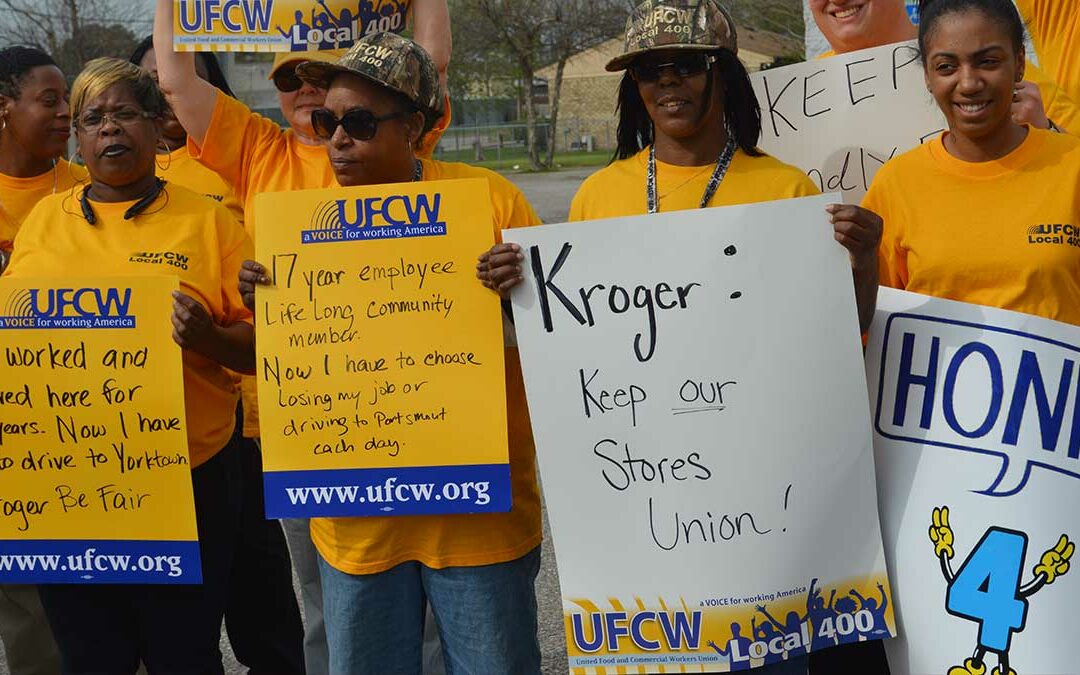In a June 28th First Quarter Earnings Call, discussing his company’s planned mega-merger with Albertsons, the Kroger CEO said, “…this merger will secure union jobs.”
Really? Give us a break.
The CEO’s comments belie Kroger’s long record of union-busting in Virginia and elsewhere. Not to mention the inconvenient fact that one day earlier, Kroger shareholders overwhelmingly rejected a proposal that the company adopt a living wage policy.
Let’s look at the record:
- In 2000, Kroger acquired 20 stores from the Hannaford Brothers chain and then refused to comply with its contractual obligations to let UFCW Local 400 organize the stores’ employees. Kroger relented only after we filed a lawsuit against the company.
- In 2004, Kroger opened a new store, #525, outside of Richmond and then threatened to arrest UFCW Local 400 representatives if they entered the store as they had every right to do. The workers were able to organize only after an arbitrator ruled that Kroger had violated its contractual obligations.
- In 2013, Kroger opened a new “marketplace” store, #540. Kroger unilaterally declared that it was an “associate choice” store and engaged in an anti-union campaign against UFCW Local 400. It took four years of litigation before an arbitrator found that this was Kroger’s third anti-union campaign and ordered the payment of damages. Kroger then filed suit to reverse the ruling in federal court and failed. Ultimately, Kroger was ordered to pay nearly $250,000 to UFCW Local 400.
- In 2014, Kroger purchased the non-union Harris Teeter chain. Ever since, it has operated these stores on an anti-union basis and fought all attempts by workers to organize.
- In 2018, Kroger purchased Farm Fresh stores in the Richmond-Tidewater area and continued its anti-union campaign at those newly purchased stores, despite the fact that they were subject to the same remedies in the arbitration over store #540.
“The notion that the proposed Kroger-Albertson’s merger would somehow be good for union members is a joke,” said Local 400 President Mark P. Federici. “In Virginia and elsewhere, Kroger has consistently tried to shirk its responsibilities under our collective bargaining agreements and tried to operate non-union everywhere it thought it could get away with it.
“If this ill-gotten merger goes through, there can be no doubt Kroger will feel even more unleashed to try to bust its employees’ unions at every opportunity,” he added.
Beyond Kroger’s anti-union record, the history of past supermarket mergers also makes a mockery of the CEO’s statement, because virtually all of them have resulted in closed stores and layoffs, as was the case with the 2015 Albertsons-Safeway merger. Many other supermarket mergers have struggled within months of being separated and ultimately failed.
Furthermore, in an effort to win government approval of the merger, Kroger and Albertsons agreed to sell 400 stores to C&S Wholesale Grocers. Tom Olson, a Safeway employee and UFCW Local 7 steward, met C&S President Mark McGowan earlier this year. “I just didn’t get a warm feeling about how he felt about taking on union contracts,” Olson told In These Times. Olson says McGowan responded to a question about organizing by claiming, “We would fight you every step of the way.”
“This merger is bad for workers, bad for consumers and bad for communities, and no amount of spin from Kroger’s CEO can change that,” Federici said. “We applaud the Federal Trade Commission for working to block this disastrous merger and we will continue doing everything we can to stop it from happening as well.”

